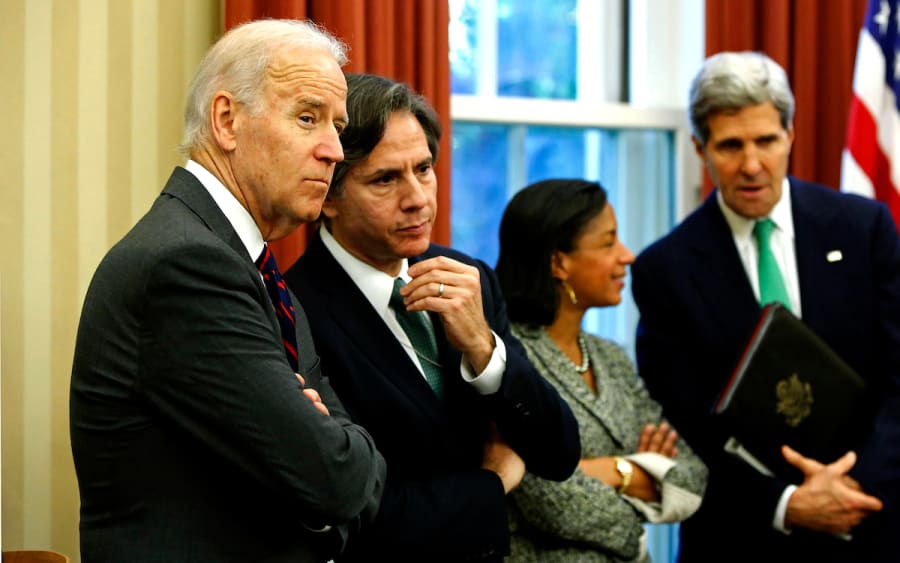US rejoins UN Human Rights Council, noncommittal on Golan Heights sovereignty
Series of moves inch back some of Trump administration's pro-Israel gestures

In an apparent reversal of recent U.S. foreign policy, Secretary of State Antony Blinken announced the Biden administration’s decision to rejoin the United Nations Human Rights Council (UNHRC) earlier this week.
The United States left the controversial organization three years ago under former President Donald Trump because of the body’s systematic anti-Israel bias.
“The United States will engage with the council as an observer,” said Blinken.
Unlike the more isolationist and skeptical stance toward international bodies favored by the former Trump administration, the Biden administration appears committed to seeking the level of engagement with international institutions that existed in the pre-Trump era.
However, Washington’s decision to rejoin the UNHRC was not without reservations.
“We recognize that the Human Rights Council is a flawed body – in need of reform to its agenda, membership, and focus, including its disproportionate focus on Israel,” Blinken said.
At the same time, the Biden administration believes that the UN body’s flaws are better addressed through engagement rather than boycott.
“It is our view that the best way to improve the council is to engage with it and its members in a principled fashion,” said Blinken. "We strongly believe that when the US engages constructively with the council, in concert with our allies and friends, positive change is within reach."
Speaking to Blinken on the U.S. decision to rejoin the UNHRC, Israeli Foreign Minister Gabi Ashkenazi emphasized the institution’s widely recognized bias against the Jewish state.
“UNHRC is a biased body with a longstanding record of flagrant discrimination against Israel. We are confident that the U.S. will utilize its re-engagement with the Council to eradicate the institutional anti-Israel discrimination at the UN and bring about much needed reforms,” said Ashkenazi.
On another issue, Blinken said that the Biden administration supports Israeli control of the Golan Heights under current political conditions in Syria. However, Blinken stopped short of endorsing the legality of the Trump administration’s decision to recognize the strategic plateau as de facto Israeli territory.
“Look, leaving aside the legalities of that question, as a practical matter, the Golan is very important to Israel’s security,” said Blinken.
He indicated that the new Washington administration shares Jerusalem’s security concerns regarding Iranian forces and pro-Iranian militias entrenched in Syria.
“As long as [Syrian President Bashar] Assad is in power in Syria, as long as Iran is present in Syria, militia groups backed by Iran, the Assad regime itself – all of these pose a significant security threat to Israel, and as a practical matter, the control of the Golan in that situation I think remains of real importance to Israel’s security,” he said.
Current security issues aside, Blinken also indicated that the Biden administration was open to reexamining the U.S. position on the Golan Heights in the future.
During the 1967 Six-Day War, Israel captured the strategic heights from Syria after the Syrian military had for years used the plateau for launching attacks on civilian Israeli border communities.
In the biblical era, the Golan Heights area was called “Bashan.” During the Great Jewish Revolt against the Romans, the Jewish City Gamla on the Golan Heights became known as the Masada of the North. In the late 19th century, Jewish pioneers returned to the area. Later, the Golan Heights was largely included in the British Palestine Mandate. However, in 1923, Great Britain ceded the territory to France, which controlled present-day Syria. Following the termination of the French mandate, the new Syrian state inherited the territory. In 1981, Israel formally annexed the territory, a move that was not recognized by the international community prior to the Trump administration’s recognition in 2019.
In late January, the Biden administration also decided to restore financial aid to UNWRA, the controversial UN body tasked with the administration of descendants of Palestinian Arab refugees. Under Trump, Washington cut its aid to the agency after it was deemed "irredeemably flawed".
However, the renewed U.S. aid will reportedly not cover the agency’s financial deficit.
“While the overall budget will remain at $806 million, same as 2020, the income forecast in the best estimates will lead to an expected shortfall equivalent to three months of operations. We therefore expect a cashflow crisis as of March this year,” said the UN agency’s spokeswoman Tamara Alrifai. "More broadly, the expected deficit would be untenable and could lead to a financial collapse of the agency."

The All Israel News Staff is a team of journalists in Israel.














